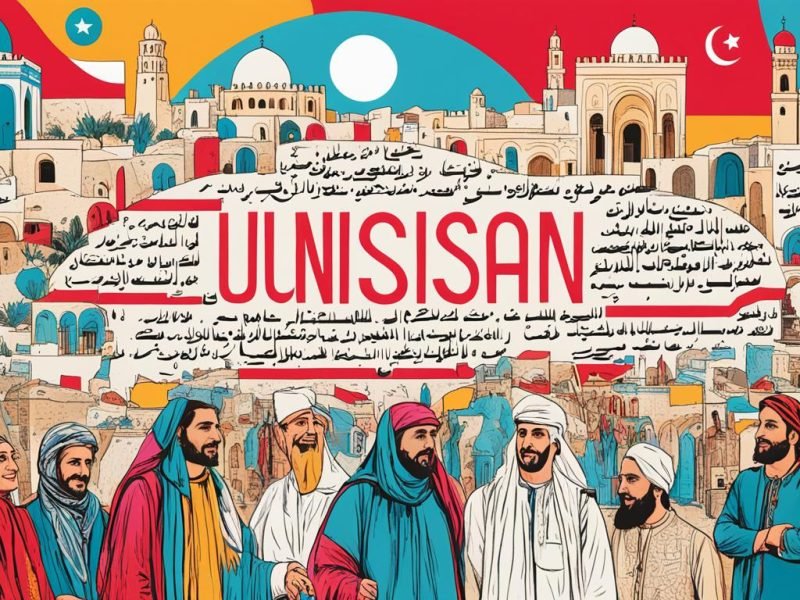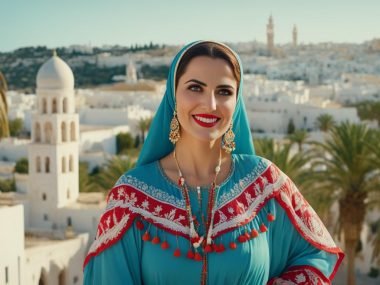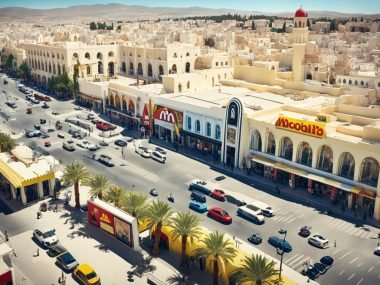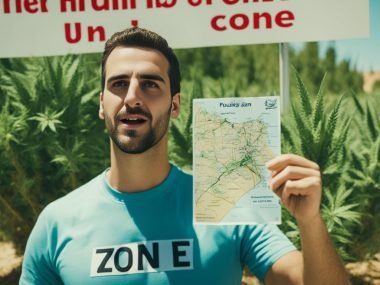Did you know around 85% of Tunisians chat in Tunisian Arabic every day? They also use other languages. These include Modern Standard Arabic and French. This mix shows Tunisia’s deep history and cultural life. Tunisia is the northernmost country in Africa. Its language history is as bright as its many languages. This country is a great example of how different languages live together. It is shaped by its history, trade, and today’s world.
Arabic is Tunisia’s main language. But many speak Tunisian Arabic. It’s a special spoken form. French is important too, because of past colonisation. It’s used in schools and offices. There are also smaller language groups. These include Berber dialects and Judeo-Tunisian Arabic. Together, they make Tunisia’s language story very rich. They show how Tunisia’s history and today’s life come together.
Key Takeaways
- Tunisia’s linguistic landscape is a blend of Modern Standard Arabic, Tunisian Arabic, and French.
- 85% of Tunisians speak Tunisian Arabic daily.
- French remains influential due to historical colonisation.
- Minority languages like Berber dialects and Judeo-Tunisian Arabic enrich the linguistic tapestry.
- Understanding Tunisia’s language history reveals its cultural and historical complexities.
The Official Language of Tunisia
In Tunisia, the main language is Modern Standard Arabic. It is very important, as said by the Tunisia Constitution. Schools teach it from an early age. This makes sure the language stays a big part of Tunisia’s culture.
All official work in Tunisia is done in Modern Standard Arabic. This shows the country is united in its language. It also connects Tunisia with other Arabic-speaking places. This language is a key part of who they are.
This language helps Tunisia stay close to nearby countries. It keeps old connections strong and meets new needs too. The role of Modern Standard Arabic in Tunisia is very big. It keeps culture going strong and helps the country run smoothly.
| Key Aspect | Description |
|---|---|
| Language Taught in Schools | Modern Standard Arabic is carefully taught in schools. It becomes a part of learning. |
| Legislative and Official Language | All official papers and government talk are in Modern Standard Arabic. |
| Constitutional Status | The Tunisia Constitution says Modern Standard Arabic is the official language. It’s very important. |
| Cultural and Social Integration | Using Modern Standard Arabic helps Tunisia connect with the Arabic-speaking world. It brings people together. |
The value of having Modern Standard Arabic as the official language is big. It brings unity inside the country and with other nations. It shows the important role the language has in Tunisia and beyond.
Tunisian Arabic: The Vernacular Language
Tunisian Arabic, or “Tounsi”, is a key part of Tunisia’s cultural wealth. It’s more than a dialect. It captures the rich history and cultural mix of the nation.
Origins and Influences
“Tounsi” began in the Phoenician era. It has grown over the years, absorbing many influences. Languages like African Romance, Neo-Punic, and words from French, Italian, and English have shaped it. Today, it’s a special language that mirrors Tunisia’s mixed past.
Mutual Intelligibility
Tunisian Arabic is similar to other Maghrebi dialects. This means Tunisians can talk with Algerian and Moroccan speakers. Yet, it remains unique. Its mix of influences makes it an important part of Tunisia’s language scene.
Tunisian Dialect: A Unique Blend
The Tunisian dialect stands out due to its mix of many languages. It shows Tunisia’s rich culture and history.
Linguistic Characteristics
Tunisian Arabic uses many words from French, Italian, and Turkish. Its structure and sounds have changed over time.
These changes reflect Tunisia’s history and the influence of other cultures. In cities and countryside, the dialect sounds very different.
Code-Switching Practices
In Tunisia, people often mix languages when they talk. They use Tunisian Arabic with French, English, and sometimes Italian.
This shows how well Tunisians can speak multiple languages. It tells us about Tunisia’s ties with Europe and the Mediterranean. Switching languages easily is common in Tunisia.
French in Tunisia: A Prestige Language
French is very special in Tunisia. It has a unique history and is still important today. Let’s explore its past and how it’s used now.
Historical Context
French in Tunisia started in the colonial times. The French rule changed Tunisia’s schools and government. French became the main language then.
After Tunisia got its freedom, there were attempts to focus more on Arabic. But French still had a strong presence. It stayed important in many areas of life. This shows its status as a prestige language.
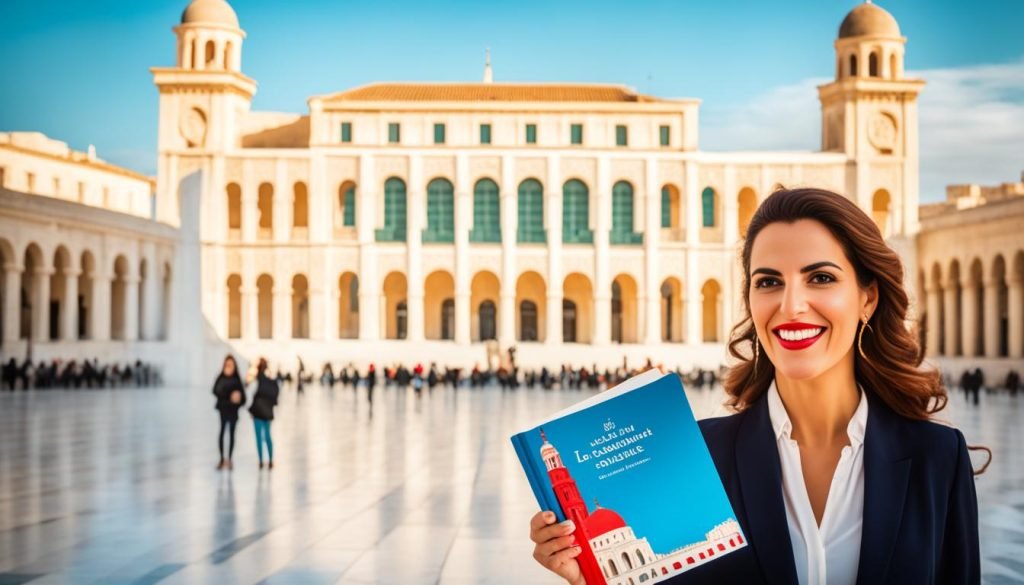
Current Usage
Today, many people in Tunisia use French a lot. It’s big in businesses, schools, and science. Being good at French is seen as a sign of being well-educated.
French is more than just a way to talk. It’s part of Tunisia’s culture. Even with attempts to use more Arabic, French is still everywhere. This shows how key it is.
| Sector | Language Preferences |
|---|---|
| Business | Predominantly French |
| Education | French alongside Arabic |
| Science & Technology | Mainly French |
| Public Administration | Mostly Arabic |
In short, French is very important in Tunisia. It’s used a lot in different places. This shows its big role in the country’s life.
Berber Languages: Preserving a Minority Heritage
In Tunisia, Arabic and French are widely spoken. But, the Berber languages are just as important. They keep the heritage of Tunisian minorities alive. Spoken in places from south villages to Djerba, they are the heart of certain communities.
These dialects, like Jerba Berber and Matmata Berber, carry stories and history. People work hard to keep their culture and ancestors’ stories alive. This is done through music, storytelling, and rituals.
Berber languages give us a peek into Tunisia’s diverse identity. Even as minority languages, they play a big role in the culture. Their stories and traditions keep the spirit of the past alive today.
| Aspect | Arabic | French | Berber Languages |
|---|---|---|---|
| Geographic Spread | Nationwide | Urban Centres | Rural Communes |
| Main Dialects | Various | N/A | Jerba Berber, Matmata Berber |
| Status | Official | Prestige | Minority |
| Cultural Significance | High | High | High |
The Role of Modern Standard Arabic in Education
Tunisia is a great example of Modern Standard Arabic’s important role in education. It uses this language as the main way of teaching in many subjects after middle school. Tunisia wants to keep its language and culture alive through education.
Educational Policies
Tunisia works hard to make Modern Standard Arabic more common in schools and everyday life. It’s replacing French with Arabic in subjects like science. This helps build a stronger national feeling and keeps the country’s stories and traditions alive.
Literary Arabic vs. Vernacular Usage
In Tunisia, learning Modern Standard Arabic does not mean forgetting the local Arabic. High Arabic is used in serious and school settings. But the everyday language is still very much alive. This shows that Tunisia values both forms of the language, each for its own purpose.
What Is The Language Of Tunisia?
Tunisia has a unique and complex language scene. Modern Standard Arabic is the formal language there. Still, for everyday talk, Tunisians use a range of languages.
Derja, or Tunisian Arabic, is the local language. It includes lots of special words and has influences from many languages. This shows Tunisia’s rich history through its daily language.
French is also commonly spoken, mainly in schools, government, and work. It links to Tunisia’s past with France. It helps in international matters and higher education too.
Besides, Tunisia has some minority languages. Berber dialects are still used by some, keeping their traditions alive. Also, Judeo-Tunisian Arabic shows the Jewish community’s past role, but it’s less spoken now.
| Language | Usage | Characteristics |
|---|---|---|
| Modern Standard Arabic | Official language | Used in formal settings, media, and education |
| Tunisian Arabic (Derja) | Everyday communication | Rich in local variations and foreign influences |
| French | Education, government, business | Legacy of colonial history, prominent in formal discourse |
| Berber dialects | Certain communities | Reflects ancient cultural heritage |
| Judeo-Tunisian Arabic | Historical use | Reflects Jewish community’s traditions and languages |
Tunisia’s languages mix history with today’s life. They show how Tunisia embraces its diverse past and present. Understanding this mix helps appreciate Tunisia’s rich culture.
Impact of Multilingualism in Tunisia
Multilingualism in Tunisia brings big benefits. It helps in both money matters and cultural ties. Tunisia shows how different languages can be powerful.
Economic Benefits
One big plus is better business. Many people in Tunisia speak French and are learning English and Italian. This makes Tunisia attractive for investment from other countries.
Businesses from Europe and beyond prefer places easy to talk to. This helps Tunisia’s economy grow.
Cultural Exchange
The mixing of cultures is another great thing. Tunisia connects with Europe through shared languages. This makes its culture richer.
It lets Tunisia and other countries understand each other better. Both sides benefit, making a strong community. This shows why languages matter in Tunisia.
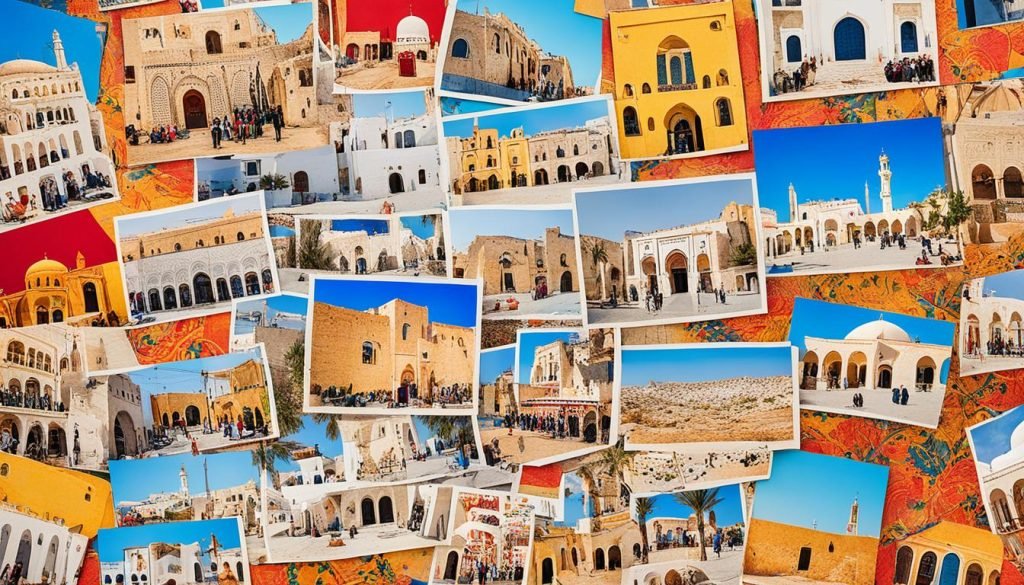
The Decline of Judeo-Tunisian Arabic
Judeo-Tunisian Arabic was once a vital part of Tunisia’s languages. It is special to the Tunisian Jewish community. But as fewer Jews live in Tunisia, this unique language is fading away.
This language’s fall is clear in Tunisia. It was common among Tunisian Jews, adding to the country’s language mix. But many Jews have left due to various changes. This has cut down the number of people who speak it.
Many reasons are behind this decline. These include changing populations and people moving away. As older speakers pass away, fewer young people learn Judeo-Tunisian Arabic. They often pick French or Modern Standard Arabic instead. This makes Judeo-Tunisian Arabic even rarer.
Yet, there are efforts to save it. Experts and groups are trying to record and keep this language. They know how important it is. But it’s hard to ignore how fast it’s disappearing. This shows how endangered languages around the world are struggling.
We need to value this language’s history. By knowing why Judeo-Tunisian Arabic is vanishing, we can cherish cultural diversity. We can also see the need to save languages at risk. It reminds us how languages change and how they shape human connections.
| Factors | Impact on Judeo-Tunisian Arabic |
|---|---|
| Demographic shifts | Reduced native speakers |
| Migration patterns | Decreased language transmission |
| Preference for dominant languages | Erosion of language use among younger generations |
| Efforts by linguists and cultural organisations | Documentation and preservation initiatives |
The fading of Judeo-Tunisian Arabic shows how fragile language diversity is. By tackling the language drop in Tunisia, we can protect the rich history and culture in these languages.
The Influence of Media on Language Use
In Tunisia, media changes how people talk a lot. TV, radio, newspapers, and online stuff have a big impact. Arabic, especially the kind spoken in Tunisia, is everywhere in media. It brings local sayings into daily talk.
Also, social media has brought new ways of mixing languages. On Facebook, Twitter, and Instagram, Tunisians mix Arabic with French and English. This shows Tunisia’s long history with many languages. It’s about the mix of old and new cultures.
At the same time, watching shows and movies from around the world changes how Tunisians speak. They learn new words and ideas from foreign shows and movies. This makes their way of speaking richer and helps them understand other cultures better.
Media really helps shape how Tunisians talk. It keeps old ways of speaking alive and brings in new words. Tunisians are always finding out new things in language, thanks to their own media and stuff from abroad.
Language and Identity in Tunisia
The link between language and identity in Tunisia is very interesting. Languages in Tunisia are more than just ways to talk. They show different cultural and historical layers of Tunisian society.
Modern Standard Arabic is the main language. It helps bring people together. It is used in schools, by the government, and in the media. Yet, Tunisian Arabic, or Darija, shows the country’s true linguistic mix. Darija includes Arabic, Berber, French, Italian, and Turkish. This shows Tunisia’s rich history and adaptability.
French is still very important in business, diplomacy, and education. It connects Tunisia with the French-speaking world. This helps in cultural exchanges and finding economic chances.
Berber languages are vital too, even though not many speak them. They help keep Tunisia’s original language alive. Trying to bring back Berber languages shows that Tunisia values all its languages.
Language, in its many forms, acts as both a mirror and moulder of cultural identity within Tunisia.
| Language | Role | Impact on Identity |
|---|---|---|
| Modern Standard Arabic | Official Language | Unified National Identity |
| Tunisian Arabic (Darija) | Vernacular Language | Daily Communication and Cultural Reflection |
| French | Prestige Language | Economic and Diplomatic Bridge |
| Berber Languages | Heritage Language | Cultural Preservation |
Understanding language and identity in Tunisia offers great insights. It shows how languages like Modern Standard Arabic, Tunisian Arabic, French, and Berber shape the nation. Each language has a special role in Tunisia’s culture and in people’s lives.
Conclusion
In closing, let’s look at Tunisia’s languages. The country has a rich mix of languages. Modern Standard Arabic is the main language. Yet, Tunisian Arabic is spoken every day, adding to the local culture.
French also plays a big role due to Tunisia’s history. It adds another layer to the language scene. The country also works hard to keep Berber languages alive. This shows Tunisia cares about all its languages. Education and jobs often use Modern Standard Arabic and French. This helps with business and sharing cultures.
Looking ahead, Tunisia will keep updating its language policies. Society’s views on languages will change too. The country’s approach to language is modern but respectful of its past. Tunisia shows how languages can live together and make a country richer.

